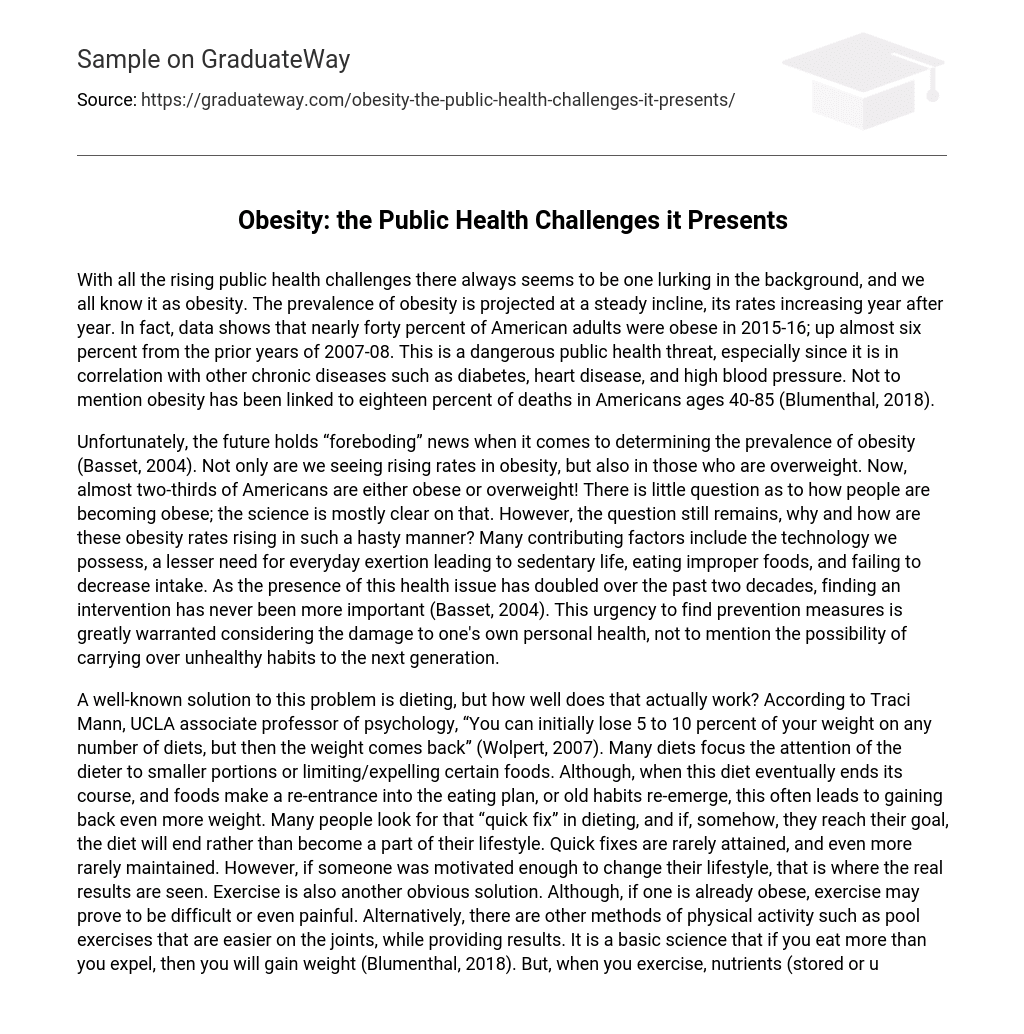With all the rising public health challenges there always seems to be one lurking in the background, and we all know it as obesity. The prevalence of obesity is projected at a steady incline, its rates increasing year after year. In fact, data shows that nearly forty percent of American adults were obese in 2015-16; up almost six percent from the prior years of 2007-08. This is a dangerous public health threat, especially since it is in correlation with other chronic diseases such as diabetes, heart disease, and high blood pressure. Not to mention obesity has been linked to eighteen percent of deaths in Americans ages 40-85 (Blumenthal, 2018).
Unfortunately, the future holds “foreboding” news when it comes to determining the prevalence of obesity (Basset, 2004). Not only are we seeing rising rates in obesity, but also in those who are overweight. Now, almost two-thirds of Americans are either obese or overweight! There is little question as to how people are becoming obese; the science is mostly clear on that. However, the question still remains, why and how are these obesity rates rising in such a hasty manner? Many contributing factors include the technology we possess, a lesser need for everyday exertion leading to sedentary life, eating improper foods, and failing to decrease intake. As the presence of this health issue has doubled over the past two decades, finding an intervention has never been more important (Basset, 2004). This urgency to find prevention measures is greatly warranted considering the damage to one’s own personal health, not to mention the possibility of carrying over unhealthy habits to the next generation.
A well-known solution to this problem is dieting, but how well does that actually work? According to Traci Mann, UCLA associate professor of psychology, “You can initially lose 5 to 10 percent of your weight on any number of diets, but then the weight comes back” (Wolpert, 2007). Many diets focus the attention of the dieter to smaller portions or limiting/expelling certain foods. Although, when this diet eventually ends its course, and foods make a re-entrance into the eating plan, or old habits re-emerge, this often leads to gaining back even more weight. Many people look for that “quick fix” in dieting, and if, somehow, they reach their goal, the diet will end rather than become a part of their lifestyle. Quick fixes are rarely attained, and even more rarely maintained. However, if someone was motivated enough to change their lifestyle, that is where the real results are seen. Exercise is also another obvious solution. Although, if one is already obese, exercise may prove to be difficult or even painful. Alternatively, there are other methods of physical activity such as pool exercises that are easier on the joints, while providing results. It is a basic science that if you eat more than you expel, then you will gain weight (Blumenthal, 2018). But, when you exercise, nutrients (stored or unstored) may be used in providing energy to your body, thus “burning the calories.” This, being the traditional idea that lifestyle changes in dieting plus exercise are the best way to lose weight and to keep it off.
Eating healthy can be more difficult than some think, especially when thinking about lower income families. More needs to be done in changing the environment to support healthier eating choices. For example, food pricing methods could change, allowing for better quality foods to be purchased for less (Bassett, 2004). Food deserts need to be reduced so that people may have access to affordable foods full of good nutrients. This approach is favorable because it puts less pressure on the individual by allowing easy access to these foods, and gives healthier, but not more expensive alternatives.
Works Cited
- D. Blumenthal and S. Seervai, ‘Rising Obesity in the United States Is a Public Health Crisis,’ To the Point, the Commonwealth Fund, Apr. 24, 2018.
- Stuart Wolpert, “Dieting Does Not Work, UCLA Researchers Report,” Science and Technology, UCLA Newsroom, Apr. 3, 2007.
- Bassett, Mary T and Sarah Perl. “Obesity: the public health challenge of our time” American journal of public health vol. 94,9 (2004): 1477.





